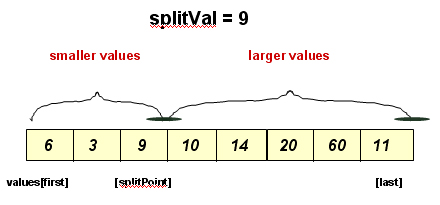QuickSort - a recursive search algorithm
Objective
Suppose we have the following array and we wish to sort them using quicksort algorithm
Idea: 1) we can select the first item in the list and use it as a "Split Value" to split the list in 2...where by everything on the left of the list is < this Split Value and everything on the right is >= this SplitValue. 2)then we recursively call split on the two lists, on the left and right of the split value.
|
Recurisive Algorithm
// Recursive quick sort algorithm
//PSUEDO CODE!!!!!!!!!!!!!!!
template <class ItemType >
void QuickSort ( ItemType A[ ] , int first, int last )
// Pre: first <= last
// Post: Sorts array A[ first. .last ] into
// ascending order
{
if ( first < last ) // general case
{ int splitPoint;
splitPoint = Split ( A, first, last) ;
// A[ first ] . . A[splitPoint - 1 ] <= splitVal
// A[ splitPoint ] = splitVal
// A[ splitPoint + 1 ] . . A[ last ] > splitVal
QuickSort( A, first, splitPoint - 1 ) ;
QuickSort( A, splitPoint + 1, last );
}
}
//PSUEDO CODE !!!!
Split(A, first, last)
{
splitVal = A[first]; //use first element as splitVal
i = first; //counter starting at first
for(j=first+1 thru last)
{ if(A[j] <= splitval)
{ i= i +1;
//swap new A[i] with A[j]
temp = A[j];
A[j] = A[i];
A[i] = temp;
}
}
//now swap A[first](contains splitVal) with A[i]
temp = A[i];
A[i] = A[first];
A[first] = A[i];
//return new splitPoint location, the location of splitVal
return i;
}
//RESULTS During First call to SPlit
Split(A, 0, 7)
1) A = [9 20 6 10 14 3 60 11 ],
splitVal = 9, splitPoint = 0 (first position)
2) After first for loop i = 0, j=2
A = [9 20 6 10 14 3 60 11]
3) After second for loop i=1 , j=3
A = [9 6 20 10 14 3 60 11]
4) After 3rd for loop i=1 , j=4
A = [9 6 20 10 14 3 60 11]
5) After 4th for loop i=1,j=5
A = [9 6 20 10 14 3 60 11]
6) After 5th for loop i=2 , j=6
A = [9 6 3 10 14 20 60 11]
7) After 6th for loop i=2, j=7
A = [9 6 3 10 14 20 60 11]
8) After 7th for loop i=2, j=8
A = [9 6 3 10 14 20 60 11]
9) DONE - as j is past last
//now swap A[first] and A[i]
A = [3 6 9 10 14 20 60 11]
splitPoint = i = 2
NOW WE MUST Call QuickSort Recursively
On the 2 sub arrays to left and right of SplitPoint that
Need sorting
QuickSort(A, 0, 1)
QuickSort(A, 3, 7)
|
Running TimeIt depends on the order of the original array elements!
|

